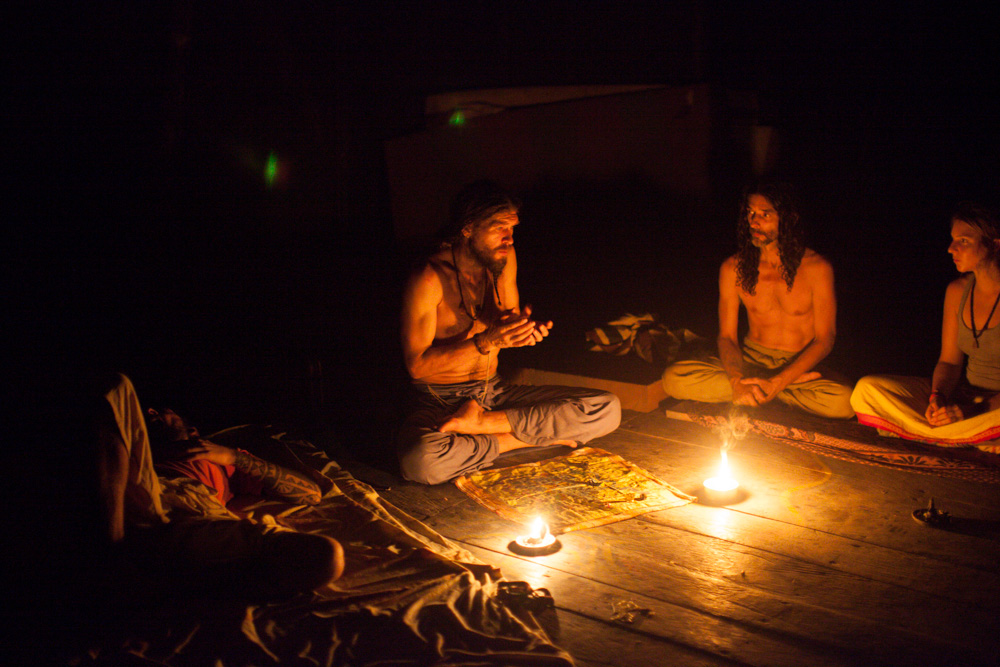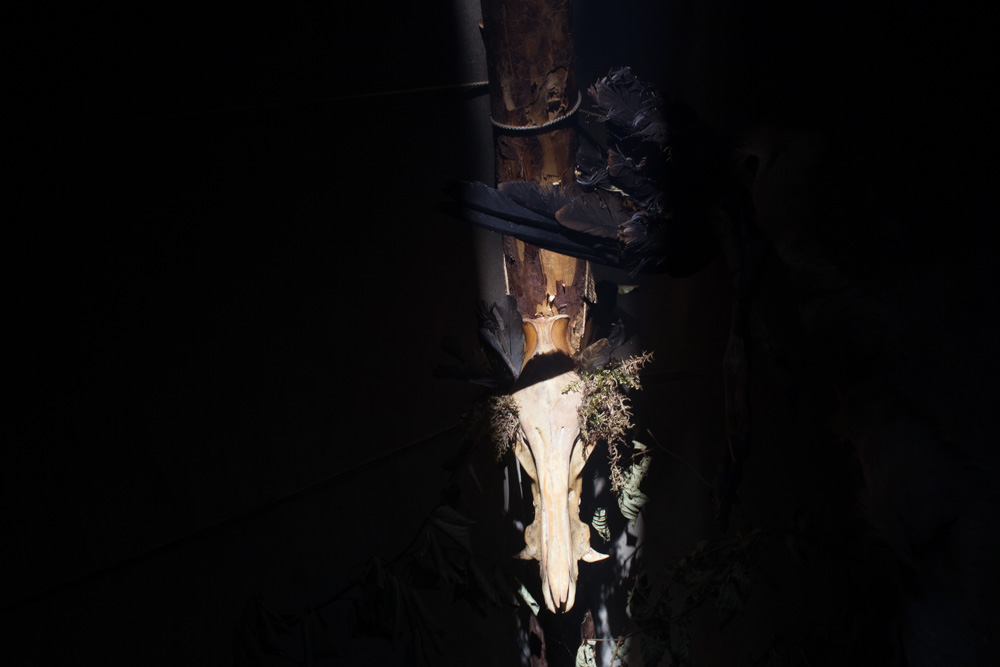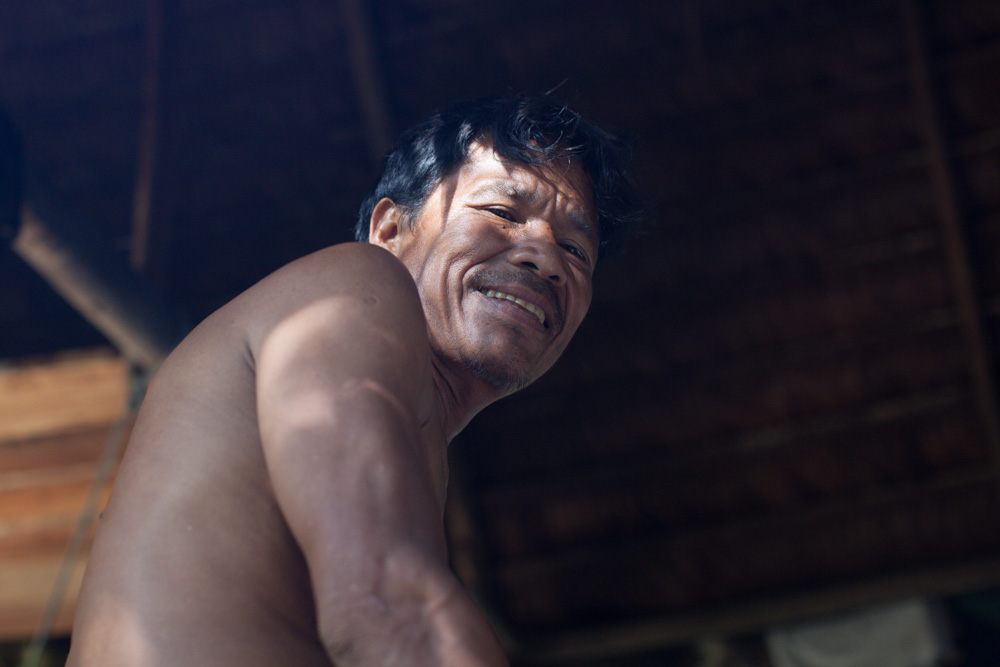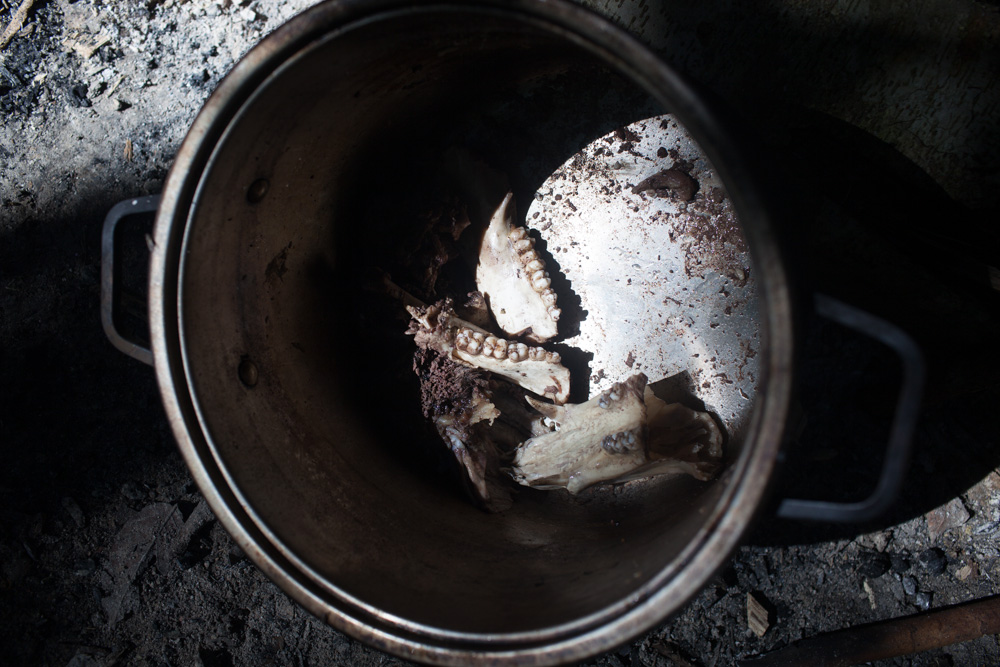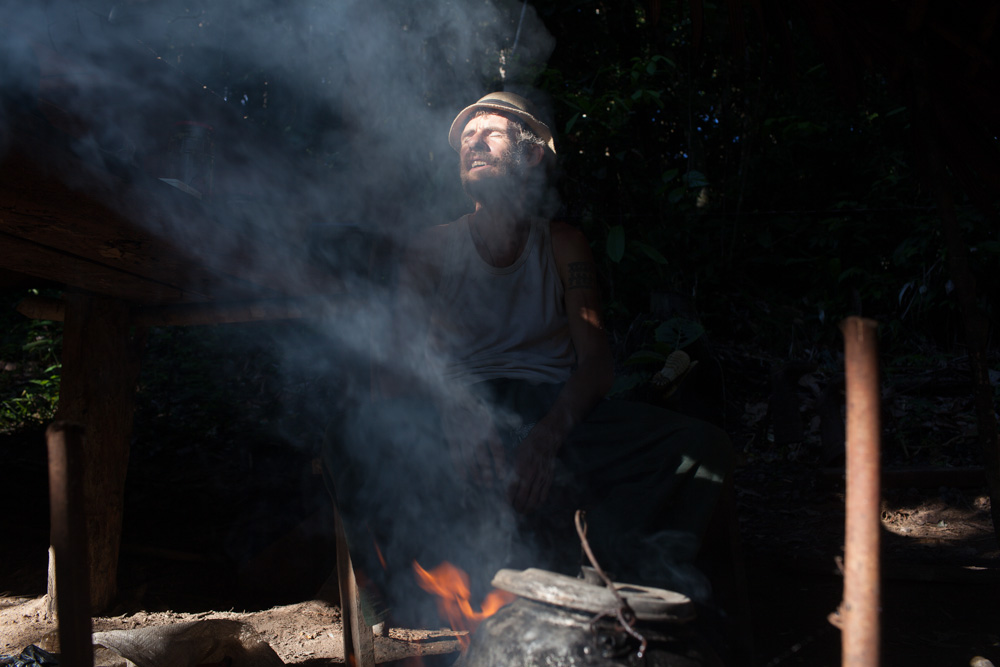Fredy Perlman: Against His-story, Against Leviathan! (1983)
( about the lifestyle of hunter gatherer and tribal societies encountered by European civilization )
“(…) But none of them ever worked. And everyone knows it. The armored Christians who later “discovered” these communities knew that these people did no work, and this knowledge grated on Christian nerves, it rankled, it caused cadavers to peep out. The Christians spoke of women who did “lurid dances” in their fields instead of confining themselves to chores; they said hunters did a lot of devilish “hocus pocus” before actually drawing the bowstring.
These Christians, early time-and-motion engineers, couldn’t tell when play ended and work began. Long familiar with the chores of zeks, the Christians were repelled by the lurid and devilish heathen who pretended that the Curse of Labor had not fallen on them. The Christians put a quick end to the “hocus pocus” and the dances, and saw to it that none could fail to distinguish work from play.”
…
( o stylu życia zbieracko-łowieckiego i plemiennych społecznościach z jakimi zetknęła się europejska cywilizacja )
” ( …) Ale nikt z nich nigdy nie pracował. I wszyscy o tym wiedzą. Opancerzeni chrześcijanie, którzy później “odkryli” te społeczności wiedzieli, że ci ludzie nie wykonywali żadnej pracy, i ta wiedza zdzierała chrześcijańskie nerwy, prowokowała ropienie, podburzała spokój pracowitych zombie. Chrześcijanie gadali o kobietach, które odprawiają “ponure tańce” na swych polach, zamiast ograniczyć się do codziennej harówy, mówili, iż myśliwi odstawiają sporo diabelskiego “hokus pokus”, zanim zabierają się za naciągnięcie cięciwy.
Ci chrześcijanie, pierwotni inżynierzy czasu i ruchu, nie mogli jasno określić gdzie kończyła się zabawa a gdzie zaczynała praca. Od dawna zaznajomieni ze znojem zeka, ci chrześcijanie byli obrzydzeni mrocznym i diabelskim poganinem, który udawał, że Klątwa Pracy nie spadła na niego. Chrześcijanie szybko więc zakończyli “hokus pokus” i tańce, i dopilnowali, by nikt już nie pomylił pracy z zabawą”.
Marshall Sahlins: “The Original Affluent Society” (1968)
If economics is the dismal science, the study of hunting-gathering economies must be its most advanced branch. Almost totally committed to the argument that life was hard in the Paleolithic, our textbooks compete to convey a sense of impending doom, leaving the student to wonder not only how hunters managed to make a living, but whether, after all, this was living? The specter of starvation stalks the stalker in these pages. His technical incompetence is said to enjoin continuous work just to survive, leaving him without respite from the food quest and without the leisure to “build culture.” Even so, for his efforts he pulls the lowest grades in thermo-dynamicsless energy harnessed per capita per year than any other mode of production. And in treatises on economic development, he is condemned to play the role of bad example, the so-called “subsistence economy.”
…
Jeżeli ekonomia to pesymistyczna nauka, studia nad ekonomiami zbieracko – łowieckimi muszą być w tym najbardziej zaawansowaną gałęzią. Niemal całkowicie przywiązane do argumentu, że życie w paleolicie było ciężkie, nasze podręczniki konkurują ze sobą w przekazaniu wrażenia nieuchronnej zagłady, pozostawiając studenta zafrasowanego nie tylko tym jak łowcy dawali radę sobie zorganizować życie, ale czy to w ogóle było życie? Widmo głodu poluje na polującego na stronach tych podręczników. Jego techniczna niekompetencja wymusza nieprzerwaną pracę, tylko w celu przetrwania, pozostawiając go bez odpoczynku od nieustannej walki o jedzenie i bez czasu wolnego niezbędnego dla “zbudowania kultury”. Pomimo tego, jego wysiłki przynoszą najmniejszy przyrost energii na głowę spośród wszystkich możliwych sposobów produkcji. W traktatach o rozwoju ekonomicznym jest on skazany na odgrywanie roli negatywnego przykładu, tak zwanej “ekonomii przetrwania”.
It will be extremely difficult to correct this traditional wisdom. Perhaps then we should phrase the necessary revisions in the most shocking terms possible: that this was, when you come to think of it, the original affluent society. By common understanding an affluent society is one in which all the people’s wants are easily satisfied; and though we are pleased to consider this happy condition the unique achievement of industrial civilization, a better case can be made for hunters and gatherers, even many of the marginal ones spared to ethnography. For wants are “easily satisfied,” either by producing much or desiring little, and there are, accordingly, two possible roads to affluence. The Galbraithean course makes assumptions peculiarly appropriate to market economies, that man’s wants are great, not to say infinite, whereas his means are limited, although improvable. Thus the gap between means and ends can eventually be narrowed by industrial productivity, at least to the extent that “urgent” goods became abundant. But there is also a Zen solution to scarcity and affluence, beginning from premises opposite from our own, that human material ends are few and finite and technical means unchanging but on the whole adequate. Adopting the Zen strategy, a people can enjoy an unparalleled material plenty, though perhaps only a low standard of living. That I think describes the hunters.
…
Będzie bardzo trudnym skorygować tą tradycyjną mądrość. Być może powinniśmy więc sformułować niezbędne poprawki w najbardziej szokujący sposób z możliwych : iż było to, jeśli o tym pomyśleć, pierwotne społeczeństwo obfitości. W potocznym rozumieniu społeczeństwo obfitości jest takim, w którym wszystkie potrzeby ludzi są łatwo zaspokajane, i chociaż miło nam myśleć, iż taki stan jest unikalnym osiągnięciem cywilizacji przemysłowej, lepszy przykład znaleźć można wśród łowców i zbieraczy, nawet wielu z marginalnych grup, pominiętych przez etnografię. Ponieważ potrzeby są “łatwo zaspokajane” albo poprzez produkowanie wiele, albo przez pożądanie mało, są z tym związane dwie możliwe drogi do obfitości. Kurs wg Galbraithe opiera się na założeniach pasujących do ekonomii rynkowych, gdzie potrzeby człowieka są wielkie, by nie rzecz nieskończone, podczas gdy jego możliwości ograniczone, chociaż zwiększalne. Przepaść między środkami a celami może być więc zmniejszana przez przemysłową produktywność, przynajmniej do poziomu w którym “niezbędne” dobra stają się obfite. Ale jest też podejście Zen do niedoboru i obfitości, opierające się na założeniach odmiennych od naszych współczesnych, mianowicie takich, że ludzkie cele materialne są skromne i ograniczone, a techniczne możliwości niezmieniające się, lecz w gruncie rzeczy wystarczające. Adoptując strategię Zen, ludzie mogą cieszyć się niezrównaną materialną obfitością, chociaż być może jedynie niskim standardem życia. To, myślę, opisuje sytuację łowców.
(…) Scarcity is not an intrinsic property of technical means. It is a relation between means and ends. We might entertain the empirical possibility that hunters are in business for their health, a finite objective, and bow and arrow are adequate to that end. A fair case can be made that hunters often work much less than we do, and rather than a grind the food quest is intermittent, leisure is abundant, and there is more sleep in the daytime per capita than in any other conditions of society. (Perhaps certain traditional formulae are better inverted: the amount of work per capita increases with the evolution of culture and the amount of leisure per capita decreases.) Moreover, hunters seem neither harassed nor anxious. A certain confidence, at least in many cases, attends their economic attitudes and decisions. The way they dispose of food on hand, for example as if they had it made.
…
(…) Niedobór nie jest związany jedynie z technicznymi możliwościami. Jest relacją między możliwościami a celami. Możemy rozważyc empiryczną możliwość, iż łowcy są w grze o swe zdrowie, określony cel, i łuk oraz strzała są narzędziami adekwatnymi do osiągnięcia tego celu. Można dobrze udokumentować fakt, iż łowcy często pracują mniej niż my, iż raczej niż ciągła harówa, krucjata za jedzeniem jest sporadyczna, czas wolny obfity, i jest więcej czasu na sen w ciągu dnia na osobę niż w jakichkolwiek innych warunkach urządzenia społeczeństwa. ( Być może pewne tradycyjne formuły lepiej brzmią odwrócone : ilość pracy na głowę wzrasta wraz z ewolucją kultury, a ilość czasu wolnego na głowę maleje ). Co więcej, łowcy nie wydają się ani zafrasowani ani nerwowi. Pewność siebie, przynajmniej w wielu przypadkach, charakteryzuje ich podejście do ekonomii i ich decyzje. Sposób w jaki traktują posiadane aktualnie jedzenie, na przykład, jest taki jakby mieli je robione na zawołanie.
(…) A certain issue is posed by exasperated comments on the prodigality of hunters, their inclination to make a feast of everything on hand; as if, one Jesuit ( Le Jeune, 1634 ) said of the Montagnais, “the game they were to hunt was shut up in a stable” (…) “I saw them [the Montagnais] in their hardships and their labors, suffer with cheerfulness. I found myself, with them, threatened with great suffering; they said to me, ‘We shall be sometimes two days, sometimes three, without eating, for lack of food; take courage, Chihine, let thy soul be strong to endure suffering and hardship; keep thyself from being sad, otherwise thou will be sick; see how we do not cease to laugh, although we have little to eat’” .
Again on another occasion Le Jeune’s host said to him: “Do not let thyself be cast down, take courage; when the snow comes, we shall eat”. Which is something like the philosophy of the Penan of Borneo: “If there is no food today, there will be tomorrow”
…
(…) Pewna kwestia jest przywołana w zirytowanych komentarzy o marnotrawstwie łowców, ich tendencjach do robienia uczty ze wszystkiego pod ręką, jak gdyby, jak jeden jezuita ( Le Jeune, 1634 ) powiedział o Innuitach,”zwierzyna, na którą mają polować, zamknięta była w stajni”. (…) “Widziałem ich ( Innuitów ) w ich trudach i pracach, jak cierpieli w pogodnym nastroju. Również ja, pomiędzy nimi, znalazłem się w tarapatach, zagrożony wielkim cierpieniem, a oni mi rzekli ‘Czasem będziemy dwa dni a czasem trzy bez jedzenia, z braku pokarmu, bądź dzielny, Chihine, niech twa dusza będzie silna by wytrwać w cierpieniu i trudzie, powstrzymaj się od smutku, w przeciwnym razie będziesz chory, patrz jak my nie przestajemy się śmiać, choć mało mamy do jedzenia’”.
Przy innej okazji, gospodarz Le Jeuna powiedział mu “”Nie pozwól sobie podupaść na duchu, zbierz odwagę, kiedy przyjdą śniegi, będziemy jeść”. Co przypomina filozofię Penanów z Borneo: “Jeśli dziś nie ma jedzenia, będzie jutro”.

